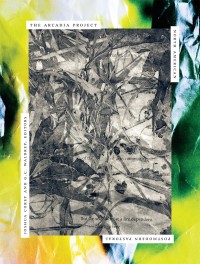25 Points: The Arcadia Project: North American Postmodern Pastoral
 The Arcadia Project: North American Postmodern Pastoral
The Arcadia Project: North American Postmodern Pastoral
edited by Joshua Corey and G.C. Waldrep
Ahsahta Press, 2012
576 pages / $28.00 buy from Ahsahta Press or SPD
1. The Arcadia Project is not in the least a conclusive project, but rather quite inconclusive. As stated in the Introduction: “an anthology such as this one must be a living and motile assemblage.”
2. Editors Joshua Corey and G.C. Waldrep do not contribute any of their own poetic work. This cuts both ways, as while it shows a measure of humility on the parts of any editor not to grandstand it is also nearly always worth having an editor’s own work (if existent) on hand for clarity of comparison’s sake within the presentation of any selection. How a poet writes interestingly reflects on how a poet reads.
3. Corey pens the Introduction, attesting: “certain tendencies are discernible in the work presented here, all of it first published after 1995” and that “Postmodern pastoral offers a means of mapping the shifting terrain of that world while maintaining its ethical consciousness that the map must never be mistaken for the territory.”
4. Waldrep doesn’t add one word of his own to the book itself. But elsewhere: http://arcadiaproject.net/the-woods-the-technology/ He offers up that it was questions such as:
Which factored into how the anthology came to be, and he adds:
Between 2008 and 2011 Josh and I sifted through hundreds of books—published since 1995 by North American writers, generously defined—as well as hundreds of submissions that came in over our electronic transom, looking for work that would guide us into the forest and try to show us something: work that would leave us alone together (in or in spite of our discrete alonenesses); work that challenged us and terrified us and moved us, that spoke to or around or from within our ecological predicament as 21st-century human creatures.
The resulting anthology is not meant to be definitive, rather provocative and generative, an early draft version of an ongoing conversation between a wide array of poets and the world we live in.
5. The lack of having any such editorial presentation of the framework behind the book’s conception within the book itself feels a disservice to readers.
6. As presented, there’s little tying together of these texts. They are left as isolated cries in a wilderness of language.
7. Poems are divided into four sections: “New Transcendentalisms,” “Textual Ecologies,” “Local Powers,” and “Necro/Pastoral” without any explicit rendering of what may or may not be meant by any of these broadly inclusive and quite permeable categorizations.
8. Questions linger, such as why not include some prose? Both statements of any kind from contributors and/or fiction, non-fiction, or works of theoretical positioning.
9. There’s a band but no bandwagon. Dozens of wheels but no cart.
10. As a reader I yearn to relate these texts in some way. To locate some vein or—what one feels is heard as a bad word by many poets these days—tradition within which the work does participate and indeed does seek continue. Of course doing so may prove some “Romantic inheritances” unavoidable. READ MORE >
February 20th, 2013 / 12:09 pm
